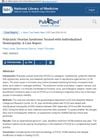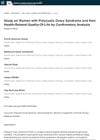 February 2020 in “Research Square (Research Square)”
February 2020 in “Research Square (Research Square)” Women with PCOS have worse physical health but similar mental health compared to those without PCOS.
 January 2019 in “Springer eBooks”
January 2019 in “Springer eBooks” Acne is linked to inflammation and insulin resistance, and is associated with various syndromes that require different treatments.
[object Object]  19 citations,
August 2016 in “Health and Quality of Life Outcomes”
19 citations,
August 2016 in “Health and Quality of Life Outcomes” Metformin helped improve the quality of life for Chinese women with PCOS, especially in physical health and symptoms like infertility, acne, and hair loss.
 12 citations,
May 2010 in “PubMed”
12 citations,
May 2010 in “PubMed” No definitive link between finasteride and male breast cancer, but further research is needed.
 6 citations,
April 2016 in “Journal of the Formosan Medical Association”
6 citations,
April 2016 in “Journal of the Formosan Medical Association” Metformin improved insulin resistance and BMI in overweight Taiwanese women with PCOS, and a 2-hour insulin test may be a good screening tool.
 April 2024 in “International journal of women's health”
April 2024 in “International journal of women's health” Adult female acne is a complex condition that can worsen with menopause, requiring holistic treatment and tailored skincare at different life stages.
 1 citations,
December 2021 in “Cureus”
1 citations,
December 2021 in “Cureus” Overweight PCOS patients often have skin issues like acne, but all PCOS patients should get lifestyle advice.
 September 2022 in “PubMed”
September 2022 in “PubMed” Personalized homeopathy medicine, along with lifestyle changes, can effectively treat Polycystic Ovarian Syndrome.
 48 citations,
April 2015 in “PLOS ONE”
48 citations,
April 2015 in “PLOS ONE” Excessive hair growth affects the quality of life of Iranian women with PCOS the most.
 July 2023 in “International Journal of Endocrinology”
July 2023 in “International Journal of Endocrinology” Centratherum anthelminticum seed extract effectively treats Polycystic Ovary Syndrome in rats.
 December 2023 in “Current psychosomatic research”
December 2023 in “Current psychosomatic research” Psychological interventions can improve the quality of life for women with PCOS.
 4 citations,
October 2022 in “Nutrients”
4 citations,
October 2022 in “Nutrients” Personalized diets, like the Mediterranean Diet and low carb diets, can help manage PCOS symptoms in obese women, and probiotics may enhance weight loss and improve metabolic health. More research is needed to find the best diet strategies.
 3 citations,
September 2021 in “International Journal of Molecular Sciences”
3 citations,
September 2021 in “International Journal of Molecular Sciences” Androgens and a high-fat diet may increase the risk of severe COVID-19 in women with PCOS by upregulating certain proteins in the heart and kidneys.
 3 citations,
August 2020 in “Nutrition Journal”
3 citations,
August 2020 in “Nutrition Journal” Spinach-derived thylakoid supplements plus a low-calorie diet helped obese women with polycystic ovary syndrome lose weight and improve their metabolism.

Women with PCOS often face menstrual issues, weight gain, and stress, affecting their quality of life.
[object Object] April 2019 in “Journal of the Endocrine Society” A 31-year-old woman was diagnosed with Complete Androgen Insensitivity Syndrome much later than usual, leading to a call for earlier detection and treatment guidelines.
20 citations,
December 1994 in “Fertility and sterility” Flutamide combined with a low-dose birth control pill effectively reduces excessive hair growth in women with polycystic ovarian disease.
 5 citations,
January 2017 in “Acta Endocrinologica”
5 citations,
January 2017 in “Acta Endocrinologica” High androgen levels in postmenopausal women may suggest an ovarian tumor, and removing it can improve heart and metabolic health.
November 2013 in “Journal of clinical & experimental dermatology research” The follicular unit extraction method for hair transplants is a technique with benefits and drawbacks.
 3 citations,
September 2022 in “Cureus”
3 citations,
September 2022 in “Cureus” Platelet-rich plasma shows promise for treating various female reproductive health issues but requires more research.
 24 citations,
October 2016 in “Oncotarget”
24 citations,
October 2016 in “Oncotarget” Finasteride has a higher risk of reproductive side effects than minoxidil.
 2 citations,
April 2021 in “Reproductive health of woman”
2 citations,
April 2021 in “Reproductive health of woman” Most women with polycystic ovary syndrome (PCOS) have menstrual issues, infertility, acne, and excessive body hair, with the most common type being the non-androgenic phenotype.
 53 citations,
September 2014 in “Reproductive Biology and Endocrinology”
53 citations,
September 2014 in “Reproductive Biology and Endocrinology” Different types of PCOS have different levels of metabolic problems, with the most severe type showing the highest disturbances.
 18 citations,
March 2014 in “Current Pharmaceutical Biotechnology”
18 citations,
March 2014 in “Current Pharmaceutical Biotechnology” Metformin helps regulate menstrual cycles, induce ovulation, and improve pregnancy outcomes in women with PCOS.
January 2021 in “Voprosy ginekologii akušerstva i perinatologii” Effective management of hyperandrogenism in young women requires accurate diagnosis and tailored treatment.
 November 2017 in “Elsevier eBooks”
November 2017 in “Elsevier eBooks” PCOS is a genetic disorder affecting women's reproductive health, with treatments focused on symptoms like insulin resistance and fertility.
 278 citations,
August 2004 in “Best Practice & Research in Clinical Obstetrics & Gynaecology”
278 citations,
August 2004 in “Best Practice & Research in Clinical Obstetrics & Gynaecology” Polycystic ovaries are defined by having 12 or more small follicles in each ovary and are found in up to 33% of women, while Polycystic Ovary Syndrome (PCOS) is the most common hormone disorder in women of reproductive age, potentially increasing risk of obesity, diabetes, and heart diseases.
 December 2022 in “International Journal of Current Science Research and Review”
December 2022 in “International Journal of Current Science Research and Review” Polycystic Ovary Syndrome (PCOS) is a common but often undiagnosed disorder in women that can cause irregular periods, infertility, and other symptoms, and can be managed with lifestyle changes, medication, and sometimes surgery.
 19 citations,
January 2013 in “Pediatrics in review”
19 citations,
January 2013 in “Pediatrics in review” The document says menstruation is important for women's health, discusses menstrual disorders, and suggests personalized treatment options.
 2 citations,
May 2006 in “Women's Health Medicine”
2 citations,
May 2006 in “Women's Health Medicine” Ovulation disorders are a major cause of infertility and menstrual problems in women.

























